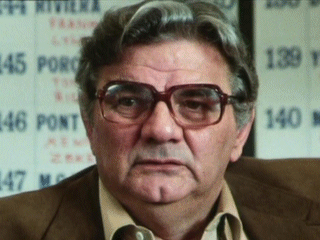Peter Richmond is one of the finest takeout writers of the past thirty years. According to his website:
Peter Richmond attended Yale University, where he studied under the late, great John Hersey and the very alive, great David Milch. Somewhere in there he also attended auto mechanics school, from which he never graduated, but which led to his eventual purchase of a ‘77 Eldorado which is currently his family’s most mechanically reliable vehicle. He was awarded a Nieman Fellowship in Journalism at Harvard, where he studied art, architecture, paleontology, playwriting and humility.
His stories have been anthologized in 13 books, including “Best American Sportswriting of the Twentieth Century,” and four appearances in “Best Sportswriting of the Year” anthologies. (And, yes, he had the title essay in Riverhead Press’ “I Married My Mother-in-Law.”) He is the co-host, with author David Kamp, of a public radio show about his tragic attachment to the New York Giants called “Tangled Up in Blue,” which airs weekly on NPR’s smallest affiliate, WHDD-FM.
…His work has appeared in several periodicals, including Grantland.com, The New Yorker, The New York Times Magazine, Vanity Fair, Rolling Stone, Parade, GQ, Details, Architecture, Parade, Golf Digest, Travel + Leisure Golf and TV Guide, as well as two amazing magazines which, sadly, no longer exist: Play and New England Monthly.
He forgot The National where, along with Charlie Pierce, Johnette Howard, and Ian Thomsen, he made “The Main Event” a must-read.
Please enjoy this story, originally published in The National, and reprinted here with the author’s permission.
“Jimmy The Greek”
By Peter Richmond
His words break the silence of a breakfast conversation that has wound down to nothing. They are as soft and insubstantial as rust flaking away, so soft that at first you think you might have heard him wrong, except that his eyes are focused on something that isn’t there, and the flesh of his face has gone completely slack, and part of a bagel sits forgotten halfway to his mouth, and there really couldn’t have been any mistaking them at all.
“I’m dead.”
He doesn’t mean he’s dead tired. He doesn’t mean he’s dead because he’s in trouble. He doesn’t mean he’s literally dead; in fact, after spending nine months in and out of Miami Heart Institute, with the bad heart and the chicken pox and shingles and diabetes, he’s looking much, much better than last year, if dangerously overweight, certainly younger than 71.
He means he’s dead as in without life. He’s says “I’m dead” because no other word wraps as neatly around the emotion that dominates his life. Because when CBS took away his job two years and four months ago with a one-paragraph release that called him “reprehensible”—to be precise, it was his remarks they called reprehensible, not him, but that distinction blurred long ago within Jimmy Snyder’s mind—they apparently carved his guts right out, which have since been replaced completely by the singular obsession that he was wronged. And instead of diminishing, that sense of injustice has festered, until all that seems left of Jimmy Snyder is the core of anger and bewilderment.
“I still don’t know what I did,” he says, but there’s no outrage to the words, no heart to them, no Greek to them. The Greek would have bellowed those words. Not whispered them into a bowl of granola.
Andy Rooney, the apparent philosopher, no simple setter of odds, may or may not have said that blacks watered down their genes, but he definitely did say that “homosexual unions” were a cause of “premature death.” He didn’t say this in a spontaneous interview in a restaurant, but in a prerecorded network television show. Then, in a draft of a letter to a magazine, Rooney said that he considered sex between men “repugnant.” For this, Rooney was given a three-month suspension. Within days his producer, Don Hewitt, said, “I spend 90% of my waking hours trying to get Andy Rooney back.” And 22 days after the suspension was announced, Rooney was indeed back.
Jimmy the Greek said some strange and unconscionable things about black athlete, which he insists reflected his admiration for them, although it didn’t come out that way, and now he’s dead. His own boss, Brent Musburger, within days of The Greek’s indiscretions, excised Snyder’s name from history the way Winston Smith used to eviscerate history for a living in Orwell’s 1984. Today no one at CBS is losing any sleep over the return of Jimmy Snyder. In fact, except for a director who has since quit the “NFL Today,” no one from CBS has even given him a phone call since they pulled the trap door.
Maybe no one really thought he’d take it this hard. Maybe that’s why Brent and Ted Shaker and the rest of the crew haven’t bothered to drop so much as a postcard in the mail. Maybe they all said to each other, “Forget it, guys, it’s just The Greek.” As if for The Greek all the rules were different. As if maybe he wasn’t the guy Musburger’s kids once loved, or the guy Shaker once thanked for having paid for the new extension on his house because the ratings of the show he was producing had grown so high.
Maybe they all thought that if anyone was a survivor, The Greek was, and that losing the “NFL Today” gig was no different than losing his right to vote when the feds convicted him of interstate gambling in 1962. But it was different. It was everything.
The truth is, The Greek had spent the first 50 years of his life in one world and then vaulted, to his surprise, into another, and he wanted, desperately, to finish his life in that second world. The first was a fringe kind of world where a man might be a “felon or might not be, where money might flow unnaturally swiftly from sources best left unseen, where distinctions between good and bad were as vague as the distinction between night and day in a town where the neon glowed 24 hours. The second was the network TV world, a place where the morals are similar but the trappings arc not.
And while it may have never seemed to the people who watched him on Sunday afternoons that it mattered to The Greek that he was on a sound stage instead of at a betting window, it mattered more than you can imagine. A man who’d once been surrounded by federal marshals loosed by Bobby Kennedy had suddenly found himself surrounded by makeup artists and the high-priced talking-head spread of Brent and Phyllis and Irv, and it felt not only good, but legitimate.
So when they yanked it out from under him, the way The Greek sees it, they might as well have yanked out the stool from beneath the feet of a man with a noose around his neck. And here he is, living in an overstuffed luxury hotel on Miami Beach where the other guests glance at him in sidelong fashion as he fills the corner table alone.
“I got to start doin’ something,” he says. “I wake up some mornin’s and you say, ‘Jesus Christ! You’re not doin’ nothin’!’ And you get a little lonesome. And disgusted. With everything. It gets a little lonesome. No one comes around. No one calls.”
And here it is again:
“I’m dead.”
Iit’s not true. A few days later, he is besieged by autograph-seekers and the rest of the bit players who make up the supporting cast of his life at the race track. As he peels hundred~dollar bills with his left hand from the baseball-sized clot of bills in his right, Jimmy the Greek is wildly alive. And if it’s only alive the way a character on stage for the 2000th production of a fraying Broadway play is alive, it nonetheless breathes and moves and barks and snarls, which beats the hell out of being dead.
So there he sits, in his customary chair near the $50 window in the clubhouse at Gulfstream, still too weak from the three months in a hospital bed to jump to his feet and run to the window when the odds suddenly get good. So he throws fifties and hundreds at the half-dozen men with the oddest of morphs who circle him like distant planets all day without ever leaving the orbit.
“Jeff!” he’ll yell, or Mike, or someone else, and Jeff will skip over and take the hundred and head for the window while The Greek says, “Get the one-four and the four-one for 50 each.”
Sometimes the one-four hits. Sometimes not. He’s down a couple thousand after the sixth race. After the seventh he’s up a couple thousand, after picking the winning horses in the fifth, sixth and seventh, the Big Three, for $3,500. One of his pals cashed his ticket, and he had to be careful on the walk back across the floor lest the bills all spring out of his hand, they’re so thickly stacked. In this he is still The Greek. When the five horse runs in and The Greek shouts in glee, other horseplayers smile and say, “Way to go, Greek,” mostly because they’re so glad to see him looking half-alive again.
But even afloat on a seas of green, The Greek’s mind is elsewhere. He’s motioned to a tall blond kid to come over for a second.
“You play basketball?” The Greek says, and the kid nods. The kid’s built like a lamppost. The kid is a friend of one of The Greek’s track friends. The kid has wandered over because The Greek is a friend and The Greek is all right.
“C’mere,” says the Greek, and the kid steps up close to the Greek’s chair.
The kid walks over. The Greek reaches out and lays his incongruously lean and fragile fingers—they should be sausages with a body like his, but they’re more like angel-hair pasta—on the kid’s calf. In the adjacent chairs, The Greek’s track friends lean in to listen, as do some other people he doesn’t know.
“See how he’s built?” says The Greek as he describes the contours of the kid’s leg with his left hand. “See how his calf is like this, then it leads up to his thigh, and there’s hardly any difference in the size? The thigh’s hardly any bigger’n his calf?”
His friends nod, and the kid is looking down at The Greek’s hand with remarkable detachment considering the circumstances.
“Now the blacks, the thigh would go out like this, and that’s where they get their spring,” says the Greek.
“But you can’t say that,” the kid says.
“Can’t say what?” The Greek asks, pleading.
“‘Black,'” the kid says. “You can’t say ‘black.'”
The friends all nod, and their heads go up and down like pistons. “Work for CBS, tell the truth, get fired,” says one of them.
“We have a coach, he was a scoring champion in his conference,” says the kid, adding, “and his thighs are, like, out to here.”
“That’s all I said!” says The Greek, spreading his hands. “That’s all I said!”
NOT ENTIRELY. What he said during lunch at Duke Zeibart’s on the Friday of Martin Luther King Day in 1988, was, essentially, three things. The first was, “If they over coaching, like everybody wants them to, there’s not going to be anything left for white people.” This one packed the most immediate impact. Snyder insisted afterward it was just a bad joke, and a compliment to blacks, too. They’ve taken over all of sport because of their drive and their desire. They want it so badlv they’ve pushed the whites right out. (Look, he said, if anyone should have been mad, it was whites. He said whites were lazy. No whites got angry at what Jimmy said.)
Then he said, “There’s 10 people on a basketball court. If you find two whites you’re lucky.” The last word was the killer. Otherwise, it’s no different from the famous tabloid basketball columnist saying, a few years ago, “The blackest thing about the Celtics is their sneakers” in reverse. But he never should have said “lucky.” He might have been using it In nothing but a careless sense. but can’t be careless with live ammunition. More than anything, this was the statement that was indefensible.
Finally, he said, “[Black superiority] goes all the way back to the Civil War, when during the slave trading the owners would breed his big black with his big woman so he could have a big black kid.”
This is the one that stuck.
At any rate, within hours, Musburger and Shaker had viewed the tapes and talked to the CBS brain trust, most of whom happened to be in Hawaii. Later than night CBS issues a statement saying it found his remarks to be “reprehensible.” No one actually said he was fired. But when Sunday showed up, he’d been deleted.
“You know, on Friday afternoon, our former colleague Jimmy the Greek, made some regrettable and offensive remarks for which he has apologized,” Musburger said the way he might have recited the Seahawks’ injury list. “Yesterday, CBS issued a statement disassociating itself from those remarks. It goes without saying that his comments do not in any way reflect the thinking or attitude of the rest of us here at CBS Sports. While we deplore the incident, we are saddened that our 12-year association with Jimmy had to end this way. And the “NFL Today” will continue from RFK Stadium in Washington in just a moment.”
And that was the sum total on CBS of discussion about the several issue The Greek had raised. Elsewhere, reaction was mixed, and Snyder had his defenders.
“Much of what he said seemed unexceptional to most whites and a good many blacks as well.” wrote Washington Post columnist Richard Cohen. “Blacks are more athletically gifted than whites. He spoke of racial differences. That is a taboo. Never mind that there are such things.”
“He’s right.” Jim Rice said a few weeks later, in the weight room off the Red Sox locker room at Fenway Park, during an interview for a Miami Herald series that had been prompted by The Greek’s firing. “It’s just a gift. Raw talent.” And a few days after that, at Yankee Stadium, Jesse Barfieid nodded: “Leaping, running—physiologically, we have an advantage.”
Recently, Synder’s former colleague, Jayne Kennedy-Overton, said, “If he was telling the truth, why blame Jimmy? Why not blame the people who made the history he spoke of?”
AFTER THE eighth race, he was up several thousand. He’d taken the 10 horse across the board for $400, and it won at 6-1. After the ninth, he was up another couple thousand with the two horse. He now had a bundle of hundred-dollar bills the size of Zeus’s fist in his right-hand pants pocket, all earned in a dizzying 90-minute span that left your mouth dry and your hands shaking just to he next to him. He has not mentioned the money on the drive back to Miami Beach.
“Brent panicked,” he says. “If he’d opened up his mouth that day for me. he could have saved my job. But he didn’t. Or if he did, it wasn’t to say anythin’ good. If only [Howardj Stringer had been there, he’d have looked at the tapes, and sat everyone down, and they coulda suspended me for that last game, and that would have been enough. But the big guys were in Hawaii, and Brent and Shaker were the only ones talkin’ to ’em. Nobody stood up for me. When you got the No. 1 producer and Brent against you nobody’s going to go against them. Who’s gonna say somethin’? Irv? The only guy who could have said somethin’ was Madden, but he was at a meeting of some sort and said it was all over by the time he got there: Summerall said somethin’ good in my behalf.
“Aw,” he says, “don’t let me start this.”
It’s absolutely huge, Jimmy’s car, as wide as a whole lane. It has a blue leather interior and the dashboard looks wooden, but it’s really only wood-pattern contact paper. On the glove compartment the pattern has all peeled away, leaving a bare metal panel. The inside of the passenger door is pocked with gray spots from the ash of his cigar, like a wall that’s been riddled with bullets.
Gliding the Cadillac to the hotel curb is like trying to dock a tugboat. It’s a car that has somehow survived beyond its age and now it is unwieldy and impractical. In these respects, it’s a lot like Jimmy. He has not gone into the new age gracefully. Watch him yelp at the pretty women—”Hey! Are you married?”—with that old man’s license to leer. He struts through his hotel, this outsized guy all in white and gold with his cane with the heavy steel knob as a handle, this purely exotic figure from some Graham Greene novel, part Sidney Greenstreet, talking too loudly, flashing that wad of hundreds. He doesn’t seem to realize that we’re in the mall age now, where the people we admire don’t come outsized any more They come in a garb of discreet homogeny. They come smooth. They come so they fit into a preconceived notion of special.
He’s not alone in this stumble into the late 20th century. Surely some of Rooney’s indiscretion can be chalked up to his inability—voluntary or otherwise—to evolve with the flow of time.
Most of us adapt. Some adapt by shedding ignorance. Others adapt by burying it. Only The Greek knows which camp he’s in. No one who’s ever spent any time at all with The Greek thinks he’s racist—”No black ever got mad at me,” he says. “The blacks all loved me”—but it doesn’t matter anymore.
Now he’s winking at the little girl in the scotch-plaid dress in the lobby. He is mugging. His face is all rubbery. She is fascinated. Her mother is leery. He loves kids. He’ll drop anything—anything—to wink a kid. How could he not? He lost two to cystic fibrosis, and he was never one himself, not after his mother was shot to death by his aunt’s estranged husband when Jimmy was 9. So he pats them and reaches out to them and laughs at them and mugs for them, and the kids love it, but the mothers wonder what in the hell this old guy is up to. And, of course, the mothers don’t know who The Greek is. The mothers only know who Bryant Gumbel and Willard Scott are.
“Without even saying goodbye. After 13 years. You think that’s fair? You think that’s fair?”
In the morning he’ll try to walk a mile on the beach, but it takes an hour. He’d rather linger over breakfast for a couple of hours until it’s time to go to the track, although these breakfasts can daunt an ego, because in the restaurant there are often several young families with children who won’t be all that amused by the man in the gold chains who frequently commandeers the telephone in the middle of the dining room and starts swearing at his stockbroker.
“I got some money in an Austrian money fund. and it was doing really good until this morning Gorbachev said somethin’ and it’s going straight down,” he says, returning to the table after one rant. “The market’s all I got. It’s the only excitement I have out of life. I win or lose 10 or 20 (thousand} a day. That’s all I got.”
He is spending a lot of time in Miami Beach. His wife, Joan, is in the house in North Carolina. “We don’t want to talk about that,” he says. Then he grows disgusted with himself: “Oh, listen, you take the good with the bad, what else you gonna do.”
Wilburn, the waiter, refills his cup. Wilburn is from Jamaica. Wilburn knows what Jimmy wants to eat before Jimmy can tell him. Jimmy regularly summons Wilburn by saying, “Get your black ass over here.” He loves to say things like, “I’m gonna get your black ass fired,” and Wilburn laughs.
Jimmy speaks like this loudly enough for the people in the restaurant to turn around and some of them smile. He does this because he wants the world to know that that is the Steubenville way he speaks, and that is the way he was speaking on Martin Luther King Day, casually, and not from prejudice. He will not allow the perception to endure. He simply will not. He Is adament.
That is the most important thing now. Not the firing. The firing, he concedes, was inevitable.
“It had gotten to the point where I kept fighting’ over the show with Shaker almost every Sunday by the end,” he days. “The last year they a;most cut me off completely. Shaker kept wantin’ to know what I was going to say beforehand. But I never knew. Which is what made it a great show. Tell him first? I’m sitting there with 100 things to say and I never knew what I was going to say. That’s what was so great about it. Everything was spontaneous.
“But I overcome that. I overcome so much. I overcome hittin’ Brent. I overcome a situation where I went to a racetrack and asked someone for figures and they were trying to grab the guy. Turned out he was a bookmaker. I overcome that. I went to Denver on a speaking engagement and said something about rednecks. Overcome that. I told Phyllis I hated her friggin’ husband, right on the air. Overcome that. I overcome everything. Then all of a sudden the thing I was paid to do I was fired for.”
Now there’s passion. The Greek has turned his chair to face his companion head on, and he’s squinting. Suddenly, it’s The Greek’s voice, all blustery and rough.
“Listen. I was the only person who never went with one camp or the other. l never cared about personalities. All I ever cared about was the good of the show. Ask anybody. I didn’t have grudges. I didn’t have vendettas. The show was everything to me. I thought this was supposedly going to be my life. “NFL Today” was … I mean I had a good PR firm, but little by little I gave everything up because of a show, then all of a sudden I woke up one day and I didn’t have it. All of a sudden I was the sonofabitch who said blacks were better athletes.”
Three men have dropped by the table. They have tans like they watched a nuclear test in person. They are on their way hack to the marina to sell more boats at the boat show, for $375,000 each.
“You got screwed, Greek,” says one, and the other two nod. After they leave, The Greek’s smiling.
“Next to survival, what’s the most important thing?” he says after they’ve gone. “Recognition.”
More important than health? Family?
Silence.
“Those are both part of survival,” he says.
Silence.
“I had a son and I lost him,” he says. Quietly. “So brilliant. He was a mathematic marvel. Professors from all over the United States—Michigan, Indiana—used to send him problems when he was a student at UNLV. He’d sit there for hours. Finally he’d look at me and say, ‘I got it Dad.” Once when a teacher went on vacation they let him teach the class. That’s how good he was. The teacher said, ‘The guy can spot me the deuce and still beat me at mathematics.'”
Silence.
“Oh, well”—these words like marbles dropping off the edge of a kitchen table.
Silence.
“He was somethin’. Tried so hard to live. He was 26. He was supposed to be dead at 2.”
Silence.
“Look,” Jimmy says. “I’ll survive. I’ll get a show. I’ll have a 900 number by the fall.”
Silence.
“Why’d they have to do it the way they did it? I begged them to not use reprehensible. It was just a word that wasn’t needed. “Take that word out,” I said. They wouldn’t. I said, “I can’t overcome that.”












